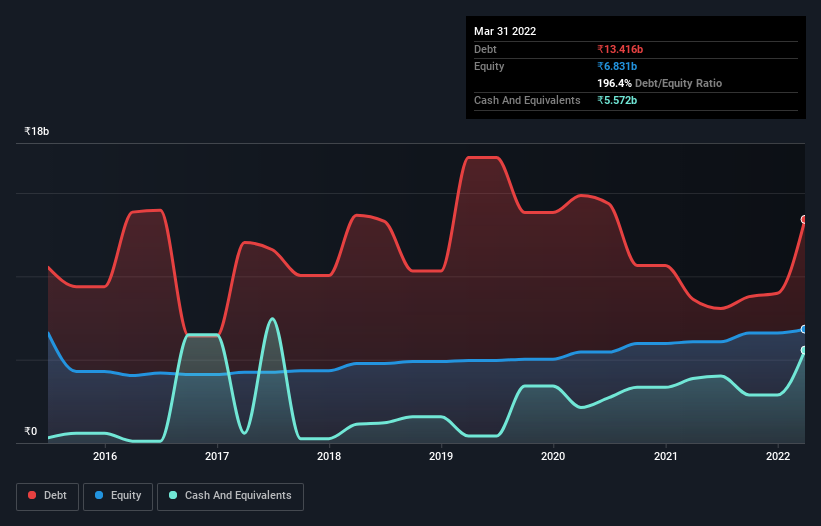Mangalore Chemicals & Fertilizers (NSE:MANGCHEFER) Takes On Some Risk With Its Use Of Debt

The external fund manager backed by Berkshire Hathaway's Charlie Munger, Li Lu, makes no bones about it when he says 'The biggest investment risk is not the volatility of prices, but whether you will suffer a permanent loss of capital.' It's only natural to consider a company's balance sheet when you examine how risky it is, since debt is often involved when a business collapses. Importantly, Mangalore Chemicals & Fertilizers Limited (NSE:MANGCHEFER) does carry debt. But is this debt a concern to shareholders?
When Is Debt A Problem?
Debt and other liabilities become risky for a business when it cannot easily fulfill those obligations, either with free cash flow or by raising capital at an attractive price. Part and parcel of capitalism is the process of 'creative destruction' where failed businesses are mercilessly liquidated by their bankers. While that is not too common, we often do see indebted companies permanently diluting shareholders because lenders force them to raise capital at a distressed price. Of course, debt can be an important tool in businesses, particularly capital heavy businesses. When we think about a company's use of debt, we first look at cash and debt together.
View our latest analysis for Mangalore Chemicals & Fertilizers
What Is Mangalore Chemicals & Fertilizers's Debt?
The image below, which you can click on for greater detail, shows that at March 2022 Mangalore Chemicals & Fertilizers had debt of ₹13.4b, up from ₹8.62b in one year. On the flip side, it has ₹5.57b in cash leading to net debt of about ₹7.84b.

How Healthy Is Mangalore Chemicals & Fertilizers' Balance Sheet?
According to the last reported balance sheet, Mangalore Chemicals & Fertilizers had liabilities of ₹17.3b due within 12 months, and liabilities of ₹3.01b due beyond 12 months. Offsetting these obligations, it had cash of ₹5.57b as well as receivables valued at ₹6.65b due within 12 months. So its liabilities outweigh the sum of its cash and (near-term) receivables by ₹8.14b.
This is a mountain of leverage relative to its market capitalization of ₹9.80b. This suggests shareholders would be heavily diluted if the company needed to shore up its balance sheet in a hurry.
In order to size up a company's debt relative to its earnings, we calculate its net debt divided by its earnings before interest, tax, depreciation, and amortization (EBITDA) and its earnings before interest and tax (EBIT) divided by its interest expense (its interest cover). This way, we consider both the absolute quantum of the debt, as well as the interest rates paid on it.
Mangalore Chemicals & Fertilizers's debt is 3.7 times its EBITDA, and its EBIT cover its interest expense 3.2 times over. Taken together this implies that, while we wouldn't want to see debt levels rise, we think it can handle its current leverage. Notably, Mangalore Chemicals & Fertilizers's EBIT was pretty flat over the last year, which isn't ideal given the debt load. There's no doubt that we learn most about debt from the balance sheet. But you can't view debt in total isolation; since Mangalore Chemicals & Fertilizers will need earnings to service that debt. So if you're keen to discover more about its earnings, it might be worth checking out this graph of its long term earnings trend.
Finally, a company can only pay off debt with cold hard cash, not accounting profits. So the logical step is to look at the proportion of that EBIT that is matched by actual free cash flow. Over the last three years, Mangalore Chemicals & Fertilizers actually produced more free cash flow than EBIT. That sort of strong cash conversion gets us as excited as the crowd when the beat drops at a Daft Punk concert.
Our View
Mangalore Chemicals & Fertilizers's interest cover and net debt to EBITDA definitely weigh on it, in our esteem. But its conversion of EBIT to free cash flow tells a very different story, and suggests some resilience. Looking at all the angles mentioned above, it does seem to us that Mangalore Chemicals & Fertilizers is a somewhat risky investment as a result of its debt. That's not necessarily a bad thing, since leverage can boost returns on equity, but it is something to be aware of. The balance sheet is clearly the area to focus on when you are analysing debt. But ultimately, every company can contain risks that exist outside of the balance sheet. Case in point: We've spotted 4 warning signs for Mangalore Chemicals & Fertilizers you should be aware of, and 2 of them are concerning.
Of course, if you're the type of investor who prefers buying stocks without the burden of debt, then don't hesitate to discover our exclusive list of net cash growth stocks, today.
New: Manage All Your Stock Portfolios in One Place
We've created the ultimate portfolio companion for stock investors, and it's free.
• Connect an unlimited number of Portfolios and see your total in one currency
• Be alerted to new Warning Signs or Risks via email or mobile
• Track the Fair Value of your stocks
Have feedback on this article? Concerned about the content? Get in touch with us directly. Alternatively, email editorial-team (at) simplywallst.com.
This article by Simply Wall St is general in nature. We provide commentary based on historical data and analyst forecasts only using an unbiased methodology and our articles are not intended to be financial advice. It does not constitute a recommendation to buy or sell any stock, and does not take account of your objectives, or your financial situation. We aim to bring you long-term focused analysis driven by fundamental data. Note that our analysis may not factor in the latest price-sensitive company announcements or qualitative material. Simply Wall St has no position in any stocks mentioned.
About NSEI:MANGCHEFER
Mangalore Chemicals & Fertilizers
Engages in the manufacture, trading, and sale of nitrogenous and phosphatic fertilizers in India.
Adequate balance sheet slight.

